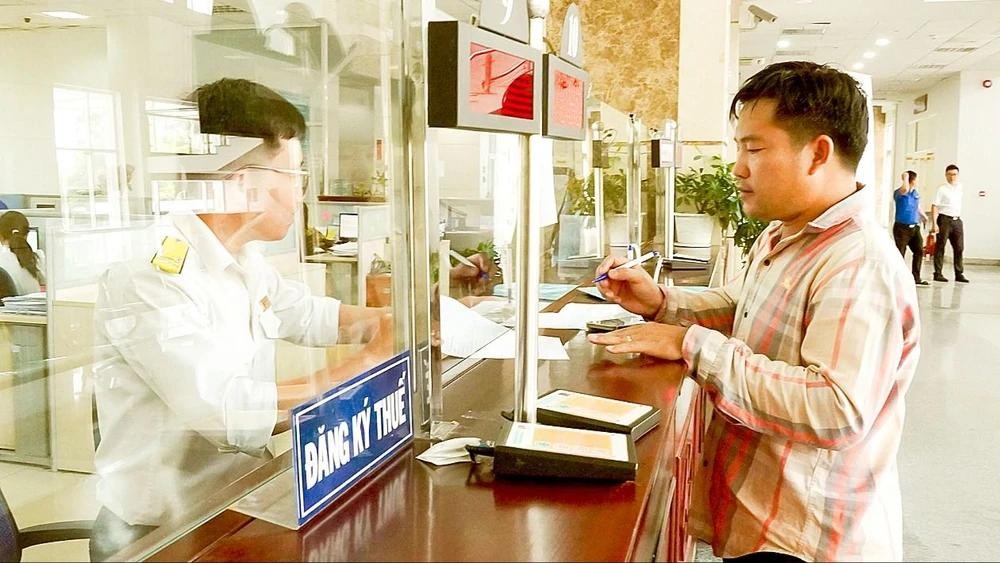
The sector has concurrently been taking steps to monitor, gather, and rigorously address any violations.
Upon learning that starting in April 2025, e-commerce platforms will be responsible for declaring and paying taxes on behalf of sellers, Ms. Pham Thi Hang, a vendor on two major platforms, expressed her concerns. She operates a store in District 7 where she sells both directly and through the platform. Having already paid a lump-sum tax based on her revenue, she is uncertain whether she will be subject to double taxation with the new platform regulations.
A representative from the Ho Chi Minh City Tax Department stated that, as a general rule, business households are individuals to the lump-sum tax method. When reporting their revenue, these households must specify whether the reported figures pertain solely to direct sales or also include online sales, which will determine the appropriate calculation method. For specific inquiries, taxpayers are encouraged to reach out directly to their designated tax office for comprehensive guidance.
Recognizing e-commerce as a vital focus for 2025, the General Department of Taxation launched the Electronic Information Portal on December 19, aimed at assisting business households and individuals engaged in e-commerce and digital platform activities with tax registration, declaration, and payment (http://canhan.gdt.gov.vn).
Director of the Department of Tax Management of Small and Medium Enterprises, Household Businesses, and Individuals under the General Department of Taxation Nguyen Thi Lan Anh stated that this portal aims to assist business households and individuals in meeting their tax obligations in the most straightforward, convenient, and efficient manner. This initiative is designed to save time and reduce compliance costs while enhancing the effectiveness of e-commerce tax management.
The tax authority has emphasized its commitment to assisting taxpayers while also pledging to enforce strict measures against violations to promote fairness and foster a conducive environment for the healthy growth of e-commerce.
Head Nguyen Hoa Bac of the Division for Management of Individual Business Households and Other Revenues at the Ho Chi Minh City Tax Department, noted that in 2024, it collaborated with platforms such as Shopee, Lazada, Tiki, Sendo, Grab, and Tiktok to aid these companies in complying with regulatory information declaration requirements.
The Tax Department has formed specialized teams to leverage the information on prominent individuals and those who engage in livestreaming sales on social media platforms. As a result of effective outreach efforts, many individual business owners have begun to voluntarily reach out to the tax authorities. Notably, one business owner in District 1 took the initiative to declare and remit over VND11.5 billion in taxes, while several others contributed amounts exceeding VND1 billion. Additionally, the tax authority successfully collected VND4.7 billion from a beauty queen and VND1.9 billion from a streamer.
In 2025, the Tax Department will persist in reviewing organizations and individuals with platform-generated revenue. The department has outlined a plan to conduct tax inspections on notable individuals, starting with an initial phase involving 35 people.
Concurrently, in Hanoi, Director Vu Manh Cuong of the Hanoi Tax Department stated that through the implementation of Project 06, the unit has digitized and interconnected information, linking data from various sources to create a substantial database on e-commerce activities. This effort has led to the identification and precise location of nearly 627,000 booths.
Simultaneously, a directory and tax management register have been created for 82,930 organizations and individuals engaged in e-commerce activities. This register includes detailed information such as names, addresses, citizen identification numbers, email addresses, phone numbers, warehouse locations, bank account details, and sales values on the platform. The data is automatically distributed to each tax branch, team, and officer across districts, wards, and communes.
Thanks to that, in 2024, the Hanoi Tax Department collected more than VND38,800 billion in taxes from e-commerce activities, an increase of 2.8 times compared to 2023. This year, the Hanoi tax authority also transferred 72 files to the police agency to strictly handle violations of tax management laws in the field of e-commerce, including 2 outstanding cases that have been prosecuted recently.
























